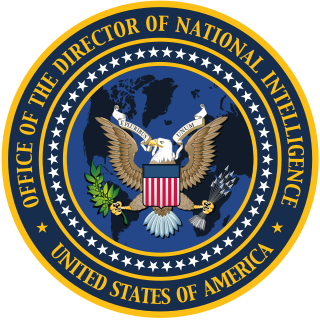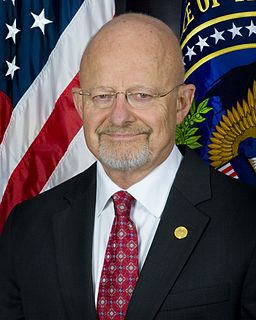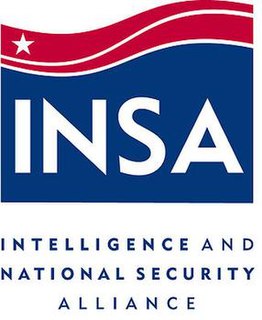
The National Security Agency (NSA) is a national-level intelligence agency of the United States Department of Defense, under the authority of the Director of National Intelligence. The NSA is responsible for global monitoring, collection, and processing of information and data for foreign and domestic intelligence and counterintelligence purposes, specializing in a discipline known as signals intelligence (SIGINT). The NSA is also tasked with the protection of U.S. communications networks and information systems. The NSA relies on a variety of measures to accomplish its mission, the majority of which are clandestine.

The director of national intelligence (DNI) is the United States Government Cabinet-level official required by the Intelligence Reform and Terrorism Prevention Act of 2004 to:

The United States Intelligence Community (IC) is a group of separate United States government intelligence agencies and subordinate organizations, that work separately and together to conduct intelligence activities to support the foreign policy and national security of the United States. Member organizations of the IC include intelligence agencies, military intelligence, and civilian intelligence and analysis offices within federal executive departments. The IC is overseen by the Office of the Director of National Intelligence (ODNI), which itself is headed by the director of national intelligence (DNI), who reports to the president of the United States.

The Foreign Intelligence Surveillance Act of 1978 is a United States federal law that establishes procedures for the physical and electronic surveillance and collection of "foreign intelligence information" between "foreign powers" and "agents of foreign powers" suspected of espionage or terrorism. The Act created the Foreign Intelligence Surveillance Court (FISC) to oversee requests for surveillance warrants by federal law enforcement and intelligence agencies. It has been repeatedly amended since the September 11 attacks.
Booz Allen Hamilton Holding Corporation is the parent of Booz Allen Hamilton Inc., an American management and information technology consulting firm, headquartered in McLean, Virginia, in Greater Washington, D.C., with 80 other offices around the globe. The company's stated core business is to provide consulting, analysis and engineering services to public and private sector organizations and nonprofits.
Project SHAMROCK, the sister project for Project MINARET, was an espionage exercise started in August 1945, which involved the accumulation of all telegraphic data entering into or exiting from the United States. The Armed Forces Security Agency (AFSA) and its successor, the National Security Agency (NSA), were given direct access to daily microfilm copies of all incoming, outgoing, and transiting telegrams via the Western Union and its associates RCA and ITT. NSA did the operational interception, and, if information that would be of interest to other intelligence agencies, the material was passed to them. "Intercepted messages were disseminated to the FBI, CIA, Secret Service, Bureau of Narcotics and Dangerous Drugs (BNDD), and the Department of Defense." No court authorized the operation and there were no warrants.

NSA warrantless surveillance refers to the surveillance of persons within the United States, including United States citizens, during the collection of notionally foreign intelligence by the National Security Agency (NSA) as part of the Terrorist Surveillance Program. The NSA was authorized to monitor, without obtaining a FISA warrant, the phone calls, Internet activity, text messages and other communication involving any party believed by the NSA to be outside the U.S., even if the other end of the communication lay within the U.S.
The Privacy and Civil Liberties Oversight Board (PCLOB) is an independent agency within the executive branch of the United States government, established by Congress in 2004 to advise the President and other senior executive branch officials to ensure that concerns with respect to privacy and civil liberties in the United States are appropriately considered in the development and implementation of all laws, regulations, and executive branch policies related to terrorism.

Michael Vincent Hayden is a retired United States Air Force four-star general and former Director of the National Security Agency, Principal Deputy Director of National Intelligence, and Director of the Central Intelligence Agency. Hayden currently co-chairs the Bipartisan Policy Center's Electric Grid Cyber Security Initiative. In 2017, Hayden became a national security analyst for CNN.

The Under Secretary of Defense for Intelligence or USD(I) is a high-ranking civilian position in the Office of the Secretary of Defense (OSD) within the U.S. Department of Defense that acts as the principal civilian advisor and deputy to the Secretary and Deputy Secretary of Defense on matters relating to military intelligence. The Under Secretary is appointed from civilian life by the President and confirmed by the Senate to serve at the pleasure of the President.

Lieutenant General Ronald Lee Burgess Jr., United States Army is a retired United States Army Lieutenant General. His last military assignment was as the 17th Director of the Defense Intelligence Agency and Commander of the Joint Functional Component Command for Intelligence, Surveillance and Reconnaissance (JFCC-ISR). Prior to that, he was Director of the Intelligence Staff in the Office of the Director of National Intelligence.

James Robert Clapper Jr. is a retired lieutenant general in the United States Air Force and is the former Director of National Intelligence. Clapper has held several key positions within the United States Intelligence Community. He served as director of the Defense Intelligence Agency (DIA) from 1992 until 1995. He was the first director of defense intelligence within the Office of the Director of National Intelligence and simultaneously the Under Secretary of Defense for Intelligence. He served as the director of the National Geospatial-Intelligence Agency (NGA) from September 2001 until June 2006.

The Intelligence and National Security Alliance (INSA) is a non-profit, nonpartisan 501(c)(6) professional organization for public and private sector members of the United States Intelligence Community, based in Arlington, Virginia.

The Protect America Act of 2007 (PAA),, is a controversial amendment to the Foreign Intelligence Surveillance Act (FISA) that was signed into law by U.S. President George W. Bush on August 5, 2007. It removed the warrant requirement for government surveillance of foreign intelligence targets "reasonably believed" to be outside the United States. The FISA Amendments Act of 2008 reauthorized many provisions of the Protect America Act in Title VII of FISA.

The President's Surveillance Program (PSP) is a collection of secret intelligence activities authorized by the President of the United States George W. Bush after the September 11 attacks in 2001 as part of the War on Terrorism. Information collected under this program was protected within a Sensitive Compartmented Information security compartment codenamed STELLARWIND.

In the United States the Associate Director of National Intelligence and Chief Information Officer is charged with directing and managing activities relating to information technology for the Intelligence Community (IC) and the Office of the Director of National Intelligence (ODNI). The IC CIO reports directly to the Director of National Intelligence (DNI). John Shermanassumed the position of IC Chief Information Officer effective September 11, 2017.

John Frederick "Jeff" Kimmons is a retired American Lieutenant General, who served as United States Army Assistant Chief of Staff for Intelligence, Commanding General, United States Army Intelligence and Security Command and Chief of Staff to the Director of National Intelligence. He was instrumental in the development of Army Field Manual, FM 2-22.3, Human Intelligence Collector Operations, which was the Army's response to actions at Abu Ghraib prison. Kimmons retired from active service on December 1, 2010 after 35 years.

Boundless Informant is a big data analysis and data visualization tool used by the United States National Security Agency (NSA). It gives NSA managers summaries of the NSA's worldwide data collection activities by counting metadata. The existence of this tool was disclosed by documents leaked by Edward Snowden, who worked at the NSA for the defense contractor Booz Allen Hamilton. Those disclosed documents were in a direct contradiction to the NSA's assurance to United States Congress that it does not collect any type of data on millions of Americans.
The mass surveillance industry is a multibillion-dollar economic sector which has undergone phenomenal growth since 2001. According to data provided by The Wall Street Journal, the retail market for surveillance tools has grown from "nearly zero" in 2001 to about US$5 billion in 2011. The size of the video surveillance market rose to US$13.5 billion in 2012, and is expected to reach US$39 billion by 2020.

Dawn Eilenberger became the Deputy Director of National Intelligence in April 2017. Previously she was the Assistant Director of National Intelligence for Policy & Strategy, Office of the Director of National Intelligence (ODNI). In this role, she oversees the formulation and implementation of Intelligence community (IC)-wide policy and strategy on the full range of intelligence issues, including collection, analysis, requirements, management and information sharing, and provides leadership for ODNI and IC initiatives on information sharing and the closure and disposition of detainees at the Guantanamo Bay detention camp.



















